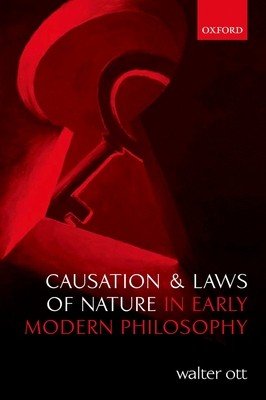
- We will send in 10–14 business days.
- Author: Walter Ott
- Publisher: Oxford University Press, USA
- ISBN-10: 0199570434
- ISBN-13: 9780199570430
- Format: 15.6 x 23.4 x 1.6 cm, kieti viršeliai
- Language: English
- SAVE -10% with code: EXTRA
Causation and Laws of Nature in Early Modern Philosophy (e-book) (used book) | bookbook.eu
Reviews
Description
Some philosophers think physical explanations stand on their own: what happens, happens because things have the properties they do. Others think that any such explanation is incomplete: what happens in the physical world must be partly due to the laws of nature. Causation and Laws of Nature in Early Modern Philosophy examines the debate between these views from Descartes to Hume.
Ott argues that the competing models of causation in the period grow out of the scholastic notion of power. On this Aristotelian view, the connection between cause and effect is logically necessary. Causes are 'intrinsically directed' at what they produce. But when the Aristotelian view is faced with the challenge of mechanism, the core notion of a power splits into two distinct models, each of which persists throughout the early modern period. It is only when seen in this light that the key arguments of the period can reveal their true virtues and flaws.
To make his case, Ott explores such central topics as intentionality, the varieties of necessity, and the nature of relations. Arguing for controversial readings of many of the canonical figures, the book also focuses on lesser-known writers such as Pierre-Sylvain Regis, Nicolas Malebranche, and Robert Boyle.
EXTRA 10 % discount with code: EXTRA
The promotion ends in 22d.07:22:21
The discount code is valid when purchasing from 10 €. Discounts do not stack.
- Author: Walter Ott
- Publisher: Oxford University Press, USA
- ISBN-10: 0199570434
- ISBN-13: 9780199570430
- Format: 15.6 x 23.4 x 1.6 cm, kieti viršeliai
- Language: English English
Some philosophers think physical explanations stand on their own: what happens, happens because things have the properties they do. Others think that any such explanation is incomplete: what happens in the physical world must be partly due to the laws of nature. Causation and Laws of Nature in Early Modern Philosophy examines the debate between these views from Descartes to Hume.
Ott argues that the competing models of causation in the period grow out of the scholastic notion of power. On this Aristotelian view, the connection between cause and effect is logically necessary. Causes are 'intrinsically directed' at what they produce. But when the Aristotelian view is faced with the challenge of mechanism, the core notion of a power splits into two distinct models, each of which persists throughout the early modern period. It is only when seen in this light that the key arguments of the period can reveal their true virtues and flaws.
To make his case, Ott explores such central topics as intentionality, the varieties of necessity, and the nature of relations. Arguing for controversial readings of many of the canonical figures, the book also focuses on lesser-known writers such as Pierre-Sylvain Regis, Nicolas Malebranche, and Robert Boyle.


Reviews